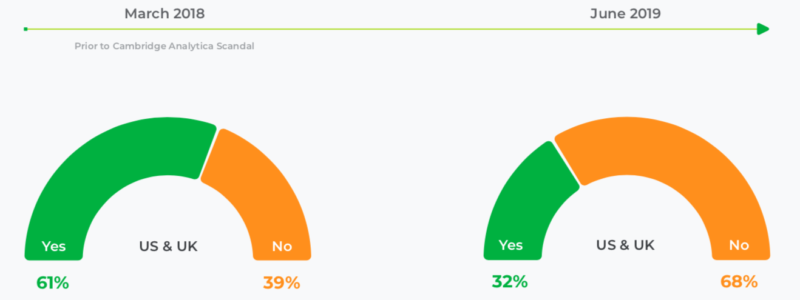Most consumers believe online privacy is impossible, survey finds
The poll of U.S. and U.K. consumers also found that people are changing their behavior and sharing less information online.
Call it privacy fatalism, but people appear increasingly resigned to an internet in which privacy is “impossible.” As a consequence, they may be permanently changing their behavior and sharing less online.
That the main finding in a new survey of more than 4,000 adults in the U.S. and U.K. conducted by FigLeaf.
Majority have changed their behavior. Asked whether Cambridge Analytica and other data and privacy scandals had impacted their online behavior, 78% of respondents said yes. Among that group, 74% said they are sharing less information online. For those whose behavior has not changed, the survey found that “they were already highly protective of their information, or that they had accepted a lack of privacy when engaging online.”

Privacy now impossible say two-thirds. The most striking finding of the survey, however, involves a shift in perceptions of whether privacy is even possible online. Compared with the 2018 survey, consumers in the U.S. and U.K. now overwhelmingly believe it is not. The “online privacy is possible” respondents have declined from 61% in 2018 to 32% in 2019.
Is online privacy possible?

Declining faith in government to protect privacy. In 2018, 75% of respondents said that government was primarily responsible for online privacy. That figure plummeted to 6% in 2019, with 48% of respondents saying that online privacy is a shared responsibility among government, the individual and the companies with whom data is shared. Another 28% said that online privacy was primarily the responsibility of the individual.
These findings may reflect a new lack of faith in the power of government to protect online privacy. The U.K. results are not separately broken out but it’s especially striking to see this in the wake of GDPR and could reflect public cynicism about its practical impact. This inference is consistent with other U.K. survey data, which found that GDPR had not substantially improved consumer trust and confidence in online privacy.
Why we should care. This survey may help explain why Facebook hasn’t really suffered in the wake of myriad privacy scandals: people continue to use the site but more cautiously, with less engagement and less willingness to share personal information. This paradox is not unlike the predicament of many frequent flyers who feel trapped by airline loyalty programs and harbor varying degrees of resentment that may not be apparent from their behavior.
Although it remains to be seen, the long-term consequences of this cynicism or loss of confidence could be very negative for marketers and brands. Consumers may be less willing to turn over personal information, sign up for newsletters, offers and loyalty programs. It could also increase skepticism toward online content, influencers and advertising, potentially reducing the effectiveness of all these channels.
Contributing authors are invited to create content for MarTech and are chosen for their expertise and contribution to the search community. Our contributors work under the oversight of the editorial staff and contributions are checked for quality and relevance to our readers. MarTech is owned by Semrush. Contributor was not asked to make any direct or indirect mentions of Semrush. The opinions they express are their own.
Related stories
New on MarTech